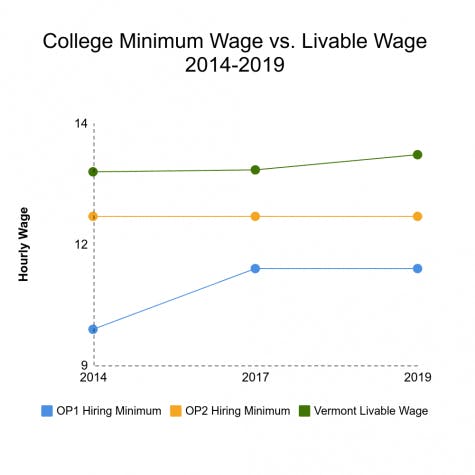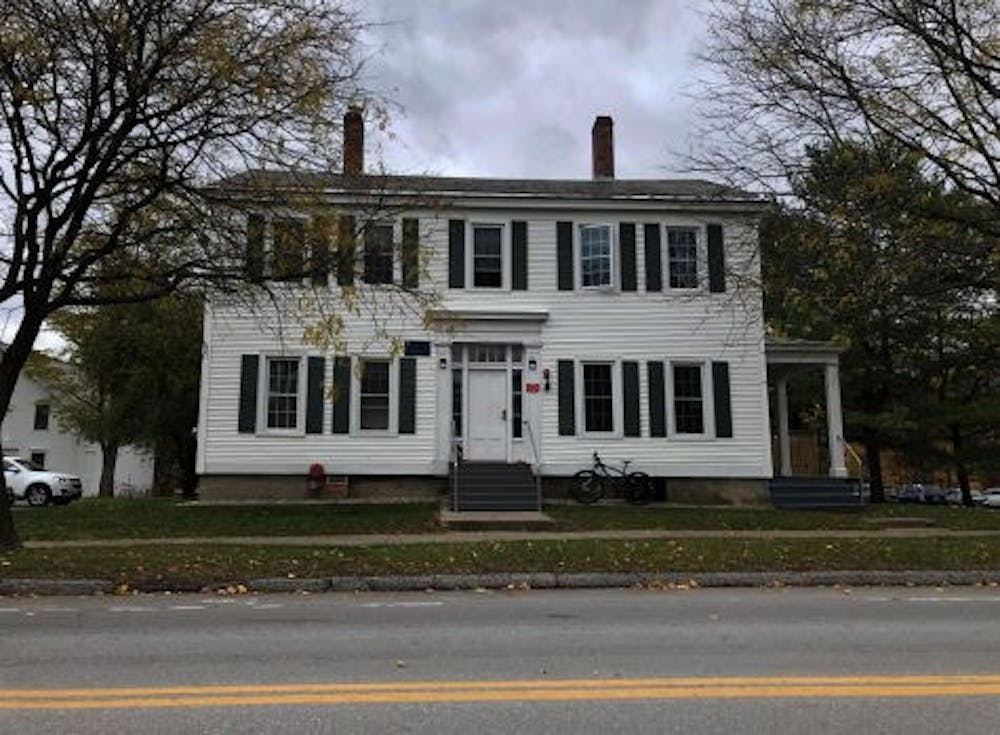A team of four independent contractors began cleaning nearly all of the small residential spaces on campus on Oct. 14. This shift came as a result of ongoing custodial staff shortages.
Associate Director of Facilities Services Missy Beckwith, who is in charge of processing resignations and new hires, said the number of vacancies has increased over the past few years.
“I’ve been here for a long time and this is the first time that I remember having as many openings as we do,” said one custodian, who The Campus will refer to as Jane. All interviewed custodians requested anonymity, for fear of retribution from the college.
Staff shortages have caused Custodial Services “to be inconsistent with the level of service we are able to provide,” according to an email Beckwith sent to employees in Facilities and Custodial Services, Public Safety and commons coordinators on Friday, Oct. 11.
“We felt the need to fix this quickly in order to provide an acceptable level of service and to manage the workload and stress level for our staff,” she continued.
The small residential spaces, mostly small houses owned by the college like Homestead and 97 Adirondack View, were selected to be cleaned by contractors to improve efficiency.
So far, independent contractors Diego Silva and Justin Smith have had generally positive experiences at the college. They described the small houses as “pretty light upkeep” and “upscale.”
A second custodian, who The Campus will refer to as Michael, felt positively about the addition of contracted workers.
“My team has been affected [by staff shortages]. For a while there, it was pretty bleak. Over time, you do notice the neglect. With the contracted workers, it’s given us more people,” he said.
However, a third custodian, who The Campus will refer to as Sarah, was disappointed by the change.
“We get close to our students in the small houses,” she said. “We miss that. We have relationships with our students in our dorms, but when you have little houses you can chat with students while you clean.”
Sarah felt her team’s workload was manageable even with the small residential spaces.
Jane appreciates the help, but believes the contractors should be assigned to academic buildings rather than residence halls.
“Custodians love to make connections with their students,” Michael said.
“When students come back to visit, you always get a hug when they see you,” Sarah said. She said that some of the female custodians on campus call themselves “surrogate moms” and “grandmas” to their students.
Having a permanent custodial staff that has relationships with commons staff members also helps create a network of people paying close attention to warning signs among students, like an abundance of alcohol in the trash or students regularly sleeping in common rooms, according to Sarah. She wondered if these aspects of the job would be lost with independent contractors, simply because they are less familiar with students and other staff members.
Unlivable wages
The college currently has 16 vacancies and 85.74 staff members, a number the office uses to indicate the presence of part-time employees. This includes those working in Custodial Services, General Services, Bread Loaf Custodial Services and Waste Management. Beckwith includes all four sectors in her staff count “since we all help cover the work of the department.” Supervisors are not included in this number.
Only half of the vacancies are being filled by contractors right now. Four contractors from Michelle Nolan’s Cleaning Service are responsible for the small houses, and four additional contractors from Full Effects assist custodial teams wherever there is the greatest need. The college has been hiring Full Effects contractors whenever the need arises for the past year.
Many believe that the staff shortages stem from the low pay custodians receive for their work. The hiring minimum for a custodian position at the college is $12.07 per hour, which falls under even the lowest estimates for a living wage in Addison County and Vermont.
“I think it’s the wage causing staff shortages,” Michael said. “People making decisions [about our pay] don’t seem to know what it takes, financially, to live here.”
A 2017 study conducted by researchers at the Massachusetts Institute of Technology (MIT) found the Addison County living wage for one adult with no children to be $12.40 per hour. For a single parent of one child, it is $25.07.
A 2018 study by the Vermont Legislative Joint Fiscal Office set the Vermont living wage at $13.34 per hour. This amount is an average of the urban and rural rates for two adults with no children.
However, the National Low Income Housing Coalition set the Addison County housing wage at $19.63 per hour — more than seven dollars over Middlebury’s hiring minimum.

Vermont living wage has increased steadily over the past five years, according to reports by the Vermont Legislative Joint Fiscal Office, while the college hiring minimum has remained unchanged since 2017.
Previous Campus reporting shows ongoing staff discontent with low wages.
“Middlebury is expensive. People paid OP1 or OP2 salaries can’t afford to live nearby,” Michael said, in reference to the college staff pay ranges.
Custodians are categorized in the OP2 range, and custodial liaisons in the OP3 range. Approximately 15% of staff are paid at the OP1and OP2 levels, the lowest of the bands.
“Custodial work is hard work,” Sarah said, “You can start at McDonald’s for $15 an hour, so if our starting pay is lower, you can say ‘I can find easier work and better pay elsewhere.’”
The college is aware of discontent with wages and is looking into the problem, as reported in this week’s coverage of staff unionization efforts.
Reaping the benefits
One thing that sets the college apart from other local employers is the benefits package, it offers, which both Michael and Sarah said attracted them to apply for positions at the college.
“I was attracted to this job because of the benefits. There are not a lot of places around here where you’ll see the benefits that we have. They are phenomenal,” Michael said.
But both agreed good benefits do not make up for inadequate pay.
“Even though we have good benefits, people can’t pay their mortgages, rent or insurance if they can’t make enough money,” Sara said. “The cost of living keeps going up. The wages aren’t keeping up with the increasing cost of living.”
Sara has never gotten a raise greater than one dollar an hour at a time; her raises have varied between 25 and 50 cents an hour. When she began working at Middlebury, she took a paycut from her previous job and hasn’t made it up in the 18 years she has worked here.
“If you have good, loyal, trustworthy help, you treat them the way they should be treated. You pay them the way they should be paid. Those qualities are worth something,” she said. “The college needs to make us feel like what we’re giving them, we’re getting back in return.”
Long hours, hard work
A Middlebury custodian’s typical work day begins at 6 a.m. and ends at 2:30 p.m., with an unpaid half-hour break in the middle of the day. Custodians who are working overtime can come in as early as 3:30 a.m. to start cleaning, and work up to 12-hour days.
With staff shortages, some custodial teams that should have four members are down to only two or three. Fully-staffed teams have stepped in to help make up the work.
Custodial work is physically demanding, and “it’s not always pretty,” Jane said. The custodial staff’s workload is especially heavy right after graduation, when custodians have to clean all the rooms for reunion and then again for summer school. Staff members work nine hour days for several weeks, doing very physical work. Student damages to college buildings also create an additional burden for the custodial staff.
“Custodial work in higher education is different than other janitorial, housekeeping or custodial jobs,” Beckwith said. “There is so much that goes above and beyond normal custodial work that makes it, in my opinion, much more challenging than average custodial position.” She cited keeping track of furniture and constantly-changing schedules, as well as building relationships with students, as examples.
Middlebury is not alone in this problem. Bowdoin housekeeping staff described the tolls of difficult workloads, and unlivable wages, in an article published by The Bowdoin Orient last year.
Facing a statewide dilemma
With the Vermont unemployment rate at 2.2% as of Sept. 2019, employers throughout the state are struggling to find workers. The college is no exception.
“We’re competing with other entry-level jobs for the same people,” Beckwith said.“We just hired two new staff and have another that’s in the post-offer, pre-employment screening process.”
Despite new hires, Beckwith says the college may need to bring in more contractors if more vacancies pop up, although she said they “generally do get more applicants in the winter time.”
The college will continue to try and fill the positions currently filled by the independent contractors with permanent staff, according to Beckwith. She also disputed that the shortage is related to the recent workforce planning initiative.
“What we are experiencing in our department has nothing to do with workforce planning,” Beckwith said. Although Custodial Services reduced the number of positions in the department because of workforce planning, Beckwith said this was “not the cause of our current situation.”
“Our situation is due to the number of vacant positions and inability to get applicants,” she said.
However, the combination of workforce planning and the new independent contractors has fostered concern amongst staff members over job security, according to Sarah.
Although her supervisor assured her that “independent contractors are not coming in to replace permanent staff,” she and others are worried. “People want job security,” she said.
Jane also expressed concern that permanent staff members would be phased out. “It feels like everyone is just waiting for the rest of the bomb to drop,” Sarah said.
The college is working to alleviate stress for its custodial staff, with several solutions in the works in addition to the new independent contractors.
Last summer, when staff was particularly short, management eliminated some services at the language schools, such as linen exchange and weekly in-room sweeping for faculty and directors, in order to lessen the custodians’ workload.
Facilities Services has also created a student custodial helper position with flexible hours, to engage students in helping with basic tasks like removing trash and vacuuming their hallways. Two students have signed up so far, and Beckwith hopes to get more involved. She also urged all faculty, staff and students to take care of campus spaces — for example, rearranging any out-of-place furniture at the end of class and taking dishes back to dining halls.
All three custodians expressed the importance of respect and appreciation for the custodial staff.
“It would be nice to feel that upper management really did appreciate everything that everyone is doing, especially when people are down-staffed and the team is pulling together and not asking for help,” Sarah said.
“Providing for your family and self preservation should not be a privilege, but that’s what’s expected as Middlebury College employees,” Jane said.
What is most important, according to Jane, is for administrators to ask what staff members need, and to really listen.




